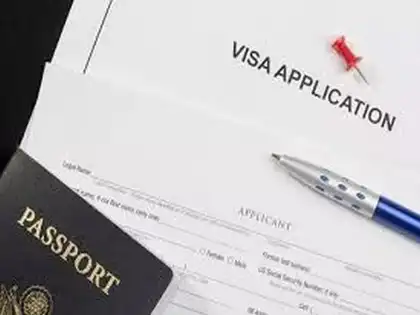Scammers Lure With False Promises of Fast-Track UAE Visas
In today’s digital age, fraud is only a click away. UAE residents and hopeful migrants are being cautioned once again as authorities raise alarms over a growing number of online ads offering “quick and guaranteed” visa services. These too-good-to-be-true offers are often traps set by cybercriminals aiming to exploit people’s dreams and desperation.
From flashy social media posts to fake websites and paid ads, these fraudulent platforms claim to provide work permits, residency visas, and even family sponsorships—without any proper documentation or verification. Many victims have lost thousands of dirhams believing they were just a few steps away from living or working in the UAE.

How These Scams Work
It all starts with a visually appealing post or a sponsored ad that promises “urgent visa approval” or “UAE job with visa support guaranteed.” These ads usually redirect users to WhatsApp numbers or personal email addresses, where scammers continue the conversation in an informal and convincing tone.
People are asked to submit their passport copies, photographs, and personal details, along with a fee to process the application. Some scammers even go as far as providing fake visa documents to make the offer seem genuine.
What most people don’t realise is that legitimate UAE visa services can only be processed through official government portals or registered typing centres. Any offer that bypasses those channels should immediately raise suspicion.

Real People, Real Losses
For many victims, the damage is not just financial—it’s emotional too. Stories have surfaced of young job seekers, single mothers, and blue-collar workers who borrowed money or sold assets hoping to start a better life in the UAE, only to be ghosted after making the payment.
In one instance, a 28-year-old jobseeker shared how he lost AED 3,000 after responding to an Instagram post that claimed to offer a “3-day employment visa.” Despite initial responses and fake documents being sent, the scammers stopped replying after the transfer was made. “It was a hard-earned amount,” he said. “I feel betrayed and helpless.”
Such stories have become increasingly common, especially with the rise of social media platforms as a source of job and immigration-related information.
Authorities Take Action—But Public Vigilance Is Key
The UAE government has been actively working to shut down such scams. Cybercrime units monitor suspicious content and regularly warn the public through official channels. Visa-related services are strictly regulated in the country, and any advertisement or platform offering services outside those regulations is operating illegally.
However, no system can be foolproof without public awareness. Authorities are urging everyone—residents and visitors alike—not to trust visa offers promoted on social media or random websites. If something seems too good to be true, it most likely is.
Instead, people are encouraged to use only official portals like the UAE government’s immigration websites or verified service centres. Additionally, verifying any agency or typing centre’s legal registration before proceeding with payments can save individuals from future heartbreak.
What to Watch Out For
There are some clear red flags when it comes to identifying fake visa advertisements. Here are a few:
- Promises of “instant” or “guaranteed” visa approval
- Communication through only WhatsApp or personal email
- Requests for upfront payments through non-official means
- No physical office address or business license
- Poor grammar or suspicious language in the ad

If any of these signs are present, it’s better to walk away than risk losing your time, money, and peace of mind.
The Rise of Online Fraud in a Post-Pandemic World
The digital transition during and after the pandemic opened new doors—not just for innovation, but also for crime. Many people are still adapting to online services, and scammers use this digital gap to their advantage. From fake job listings to visa scams, the tactics have become more refined and harder to detect.
What makes this worse is the vulnerability of the target audience. People seeking jobs, better opportunities, or a new start are often in a state of urgency and emotional stress. This makes them more likely to overlook obvious red flags and trust someone who offers a shortcut.
That’s why public education and media literacy have become just as important as technical security systems. Knowing how to recognise a scam before falling for one can make all the difference.
Advice for Those Already Trapped
If you or someone you know has already fallen into such a trap, all hope is not lost. Victims are advised to:
- Report the scam to local police or cybercrime units immediately
- Keep screenshots, chat records, and transaction details as evidence
- Inform their bank to see if the transaction can be traced or reversed
- Share their experience with others to raise awareness and prevent similar incidents
Authorities also remind victims that filing a complaint, even if the money isn’t recovered, helps in the larger investigation against cybercriminal networks.

A Reminder to Stay Smart and Stay Safe
As the UAE continues to be a beacon for global talent and business, it’s no surprise that scammers target those looking to relocate or work in the country. But with stronger awareness and the support of official systems, people can protect themselves from falling prey.
The bottom line? There are no shortcuts when it comes to legal processes. Visas are serious documents issued only through legal channels. If someone claims otherwise, they are not doing you a favour—they are trying to rob you.
So next time you see a flashy ad promising a “fast-track UAE visa,” take a pause. Do your research. Verify the source. And most importantly, trust only official platforms. A little caution today can save you from major regret tomorrow.
Do follow UAE Stories on Instagram
Get UAE Golden Visa Without Sponsor: ICP Issues Official Guide with 8 Steps for Investors













